- Home
- Prelims
- Mains
- Current Affairs
- Study Materials
- Test Series
 EDITORIALS & ARTICLES
EDITORIALS & ARTICLES
Hit List Questions 68-PPP 100 PRELIMS 2024 - 86
Questions & Explanations:
|
1. |
Consider the following statements: 1. The Chairperson and the members of Lokpal are appointed by the President on the recommendation of Council of Minister. 2. Half of the members of the Lokpal shall come from amongst the SCs, the STs, the OBCs, minorities and women. 3. Lokpal can suo motu proceed against any public servant. Which of the statements given above is/are correct? (a) 2 only (b) 1 and 2 only (c) 1 and 3 only (d) 2 and 3 only
|
|
2. |
How many of the following is/are correctly paired w.r.t. Committees of the Constituent Assembly and their heads? (1) The Union Powers Committee - Pandit Jawaharlal Nehru (2) The Steering Committee - Dr. Rajendra Prasad. (3) States Committee – Sardar patel (a) Only two (b) Only one (c) All the three (d) None of these
|
|
3. |
The correct chronological sequence from the earlier to the latest: 1. First nuclear test conducted by India. 2. Twenty-year treaty of peace and relationship between India and Soviet Union. 3. The Tashkent Agreement. 4. The Panchsheel declaration. (a) 4321 (b) 4312 (c) 4213 (d) 4231
|
|
4. |
The New START treaty is signed between (a) USA & Russia (b) USA & Iran (c) USA and Ukraine (d) USA and Israel
|
|
5. |
The term “Single Convention” that is flashing in news refer to the context of (a) Control of Biomedical wastes (b) Narcotics Control (c) Regulating E wastes (d) Disposal of Solar Panel wastes
|
|
6. |
What is “Hawkish Stance”? (a) It indicates that the central bank’s top priority is to keep fiscal deficit low. (b) It indicates that the central bank’s top priority is to keep the inflation low. (c) It indicates that the central bank’s top priority is to keep high moral suasion. (d) It indicates that the central bank’s top priority is to meet the requirements of FRBM Act.
|
|
7. |
Which of the following articles of Indian Constitution are being contexted by the proponents and opponents of DNA Profiling Bill?. 1. Article 20 (3) 2. Article 21 3. Article 51A(h) 4. Article 51A(j) (a) 1& 2 by the Opponents and 3 & 4 by the proponents. (b) 2 by the Opponents and 3 by the proponents. (c) 2 by the Opponents and 3 & 4 by the proponents. (d) 1 & 2 by the Opponents and 4 by the proponents.
|
|
8. |
Which of the following is/are true w.r.t. “Sir Creek Dispute”?. (a) It opens up in the Arabian Sea and roughly divides the Kutch region of Gujarat from the Sindh Province of Pakistan. (b) Green Line which effectively implied that the creek belonged to Sindh and, therefore, to Pakistan, claims Pakistan. (c) Both (a) and (b) (d) Neither (a) nor (b)
|
|
9. |
Which of the following states/UTs was/were foreign territories before acquisition by India? 1. Sikkim 2. Daman and Diu 3. Dadra and Nagar Haveli 4. Nagaland (a) 1 only (b) 1, 2, and 3 only (c) 1 and 4 only (d) 2, 3, and 4 only
|
|
10. |
With reference to headline inflation in India, consider the following statements? 1. It is based on WPI. 2. It excludes food and energy sectors. (a) Only 1 is true (b) Only 2 is true (c) Both 1 and 2 are true (d) Neither 1 nor 2 is true
|
|
11. |
(1) It was founded in 1919 following the Treaty of Versailles. (2) It is held bi-annually. Which of the above is/are correct w.r.t. Munich Security Conference?. (a) Only 1 (b) Only 2 (c) Both 1 and 2 (d) Neither 1 Nor 2
|
|
12. |
1. National Green Tribunal 2. Central Information Commission 3. Competition Commission of India Which of the above is/are quasi-judicial bodies?. (a) 1 and 3 only (b) 1 and 2 only (c) 2 and 3 only (d) All of the above
|
|
13. |
1. Article 371-C - Meghalaya 2. Article 371-F - Sikkim 3. Article 371-G - Mizoram 4. Article 371-H - Arunachal Pradesh How many pairs w.r.t. Articles of Indian Constitution given above are correctly matched? (a) One pair only (b) Two pairs only (c) Three pairs only (d) All the four pairs
|
|
14. |
1. The maximum number of directors of a co-operative society shall not exceed twenty-one. 2. The state legislature shall provide for the reservation of three seats for women on the board of every co-operative society. Which of the statements given above is/are correct w.r.t. the co-operative societies mentioned in part IX-B of the constitution? (a) 1 only (b) 2 only (c) Both 1 and 2 (d) Neither 1 nor 2
|
|
15. |
1. The committee was set up under the provisions of Government of India Act 1919. 2. Prime Minister appoints the chairman of the committee. 3. The Committee consists of 22 Members of which 12 are from Lok Sabha and 10 are from Rajya Sabha. Which of the statements given above is/are not correct with reference to Public Accounts Committee? (a) 1 only (b) 2 and 3 only (c) 1 and 2 only (d) 2 only
|
|
16. |
1. It has the Pre-packaged Insolvency Resolution Process (PIRP), also called ‘pre-packs’ as an insolvency resolution mechanism for Micro, Small and Medium Enterprises (MSMEs). 2. It lacks provisions to deal with cross border insolvency. 3. Growing haircuts contribute to its success to achieve its goals. Which of the statements given above is/are incorrect w.r.t. The Insolvency and Bankruptcy Code? (a) 1 and 3 only (b) 1 and 2 only (c) 2 and 3 only (d) 1, 2 and 3
|
|
17. |
In which of the following cases the governor of a state in India has constitutional discretion? 1. Reservation of a bill for the consideration of the President. 2. Recommendation for the imposition of the President’s Rule in the state. 3. While exercising his functions as the administrator of an adjoining union territory. 4. Seeking information from the chief minister with regard to the legislative matters of the state. (a) 1 and 2 only (b) 2 and 4 only (c) 1, 2 and 3 only (d) 1, 2, 3 and 4
|
|
18. |
Social overhead capital includes all the ‘basic’ services required in the production process such as 1. transport and irrigation 2. health and medical facilities 3. agricultural activities 4. energy, education (a) 2 and 3 only (b) 2 only (c) 1 and 2 only (d) 1, 2 and 4 only
|
|
19. |
The scope of expression “procedure established by law” occurring in Article 21 was expanded in the case (a) A.K. Gopalan Vs. State of Madras (b) Charanjit Lal Chowdhury Vs. Union of India (c) Golaknath Vs. Union of india (d) Menka Gandhi Vs. Union of india
|
|
20. |
The weapon of expunction seen in Parliamentray news refer to the (a) issue of office of profit (b) doctrine of colorable legislation (c) parliamentary privileges (d) supremacy of parliament |
|
21. |
What is/are true? 1. Currency Depreciation is a reflection of higher nominal demand for imported goods from final consumers. 2. The idea of imported inflation is a variant of cost-push inflation. (a) Only 1 is true. (b) Only 2 is true. (c) 1 & 2 are true (d) Neither 1 nor 2 is true
|
|
22. |
Which of these is/are totally and directly audited by the Comptroller and Auditor General of India?. 1. Air India 2. Life Insurance Corporation of India 3. Food Corporation of India 4. Reserve Bank of India (a) 1 only (b) 2 and 4 only (c) 1, 2 and 4 only (d) 1, 2, 3 and 4
|
|
23. |
Which of the following is/are TRUE w.r.t. GST Council voting rules ?. 1. Every decision of the GST Council has to be taken by a majority of not less than three-fourths of the weighted votes of the members present. 2. The vote of the central government has a weightage of one-third of the total votes cast. 3. The votes of all the state governments taken together have a weightage of two-thirds of the total votes cast in that meeting. (a) 1 and 2 (b) 2 and 3 (c) Only 1 (d) 1, 2 and 3
|
|
24. |
Which of the following were items imported by Roman empire from India?. (1) Muslin (2) Cutlery items (3) Leather (a) Only 1 (b) Only 2 (c) 1, 2 and 3 (d) 1 and 2
|
|
25. |
With reference to the Attorney General of India, Consider the following statements: 1. He can take part in the proceedings of the Lok Sabha. 2. He can be a member of a committee of the Lok Sabha. 3. He cannot take part in the proceedings of the Joint Sittings of the Parliament. 4. He can vote in Lok Sabha. Which of the statements given above are correct? (a) 1 and 2 only (b) 1, 2 and 3 only (c) 3 and 4 only (d) 1, 2 and 4 only |
EXPLANATIONS
|
1. |
The selection of the Chairperson and the members of Lokpal shall be through a Selection Committee consisting of the Prime Minister, the Speaker of the Lok Sabha, the Leader of the Opposition in the Lok Sabha, the Chief Justice of India or a sitting Supreme Court Judge nominated by the Chief Justice of India and an eminent jurist to be nominated by the President of India on the basis of recommendations of the first four members of the selection committee. The Lokpal to consist of a Chairperson with a maximum of 8 members of which 50% shall be judicial members. 50% of the members of the Lokpal shall come from amongst the SCs, the STs, the OBCs, minorities and women. The following are the drawbacks (shortcomings) of the Lokpal and Lokayuktaas Act, 2013: 1. Lokpal cannot suo motu proceed against any public servant. 2. Emphasis on form of complaint rather than substance. 3. Heavy punishment for false and frivolous complaints against public servants may deter complaints being filed to Lokpal. 4. Anonymous complaints not allowed - Can’t just make a complaint on plain paper and drop it in a box with supporting documents. 5. Legal assistance to public servant against whom complaint is filed. 6. Limitation period of 7 years to file complaints. 7. Very non-transparent procedure for dealing with complaints against the PM. |
A |
|
2. |
https://blog.ipleaders.in/making-constitution-india-detailed-analysis/ |
A |
|
3. |
(a) Panchsheel-1954 (b) Tashkent Agreement-1966 (c) Twenty year treaty-1971 (d) First nuclear test-1974 |
A |
|
4. |
A |
|
|
5. |
https://unis.unvienna.org/unis/en/pressrels/2024/unisnar1480.html |
B |
|
6. |
A hawkish stance indicates that the central bank’s top priority is to keep the inflation low. During such a phase, the central bank is willing to hike interest rates to curb money supply and thus reduce the demand. A hawkish policy also indicates tight monetary policy. When the central bank increases rates or ''tightens'' the monetary policy, banks too increase their rate of interest on loans to end borrowers which, in turn, curbs demand in the financial system. |
B |
|
7. |
A |
|
|
8. |
C |
|
|
9. |
Acquired territories § Being a sovereign state, India can acquire foreign territories according to the modes recognised by international law, i.e., cession (following treaty, purchase, gift, lease or plebiscite), occupation (hitherto unoccupied by a recognised ruler), conquest or subjugation. § For example, India acquired several foreign territories such as Dadra and Nagar Haveli; Goa, Daman and Diu; Puducherry; and Sikkim since the commencement of the Constitution . § The State of Nagaland was formed by taking the Naga Hills and Tuensang area out of the state of Assam i.e., internal readjustment.
Hence the constitution has categorically defined the power of parliament for creation of new states of alter the boundaries of the existing states. By using these provision parliaments has created various states like Telangana, Haryana, etc. https://blog.ipleaders.in/laws-governing-union-and-its-territories-under-indian-constitution/ |
B |
|
10. |
D |
|
|
11. |
Munich Security Conference (MSC): · It is the world''s leading forum for debating international security policy. · Objective: To build trust and contribute to the peaceful resolution of conflicts by sustaining a continuous, curated, and informal dialogue within the international security community. · It has been held in Munich, Bavaria, Germany, since 1963. · The conference is held annually in February. · It brings together security experts, politicians, military leaders, and the defence industry from around the world. · MSC regularly convenes high-profile events on particular topics and regions and publishes the Munich Security Report, an annual digest of relevant figures, maps, and research on crucial security challenges. North Atlantic Treaty Organization (NATO): · It is a transatlantic security alliance of 31 like-minded North American and European countries. · It was established by the North Atlantic Treaty(also called the Washington Treaty) on April 4, 1949. · Aim: To protect peace and to guarantee the territorial integrity, political independence, and security of the member states. · Article Five of the treaty: If an armed attack occurs against one of the member states, it should be considered an attack against all members, and other members shall assist the attacked member, with armed forces if necessary. · This article forms the core of the Alliance, a promise of collective defence. · Headquarters: Brussels, Belgium. |
D |
|
12. |
|
D |
|
13. |
Article 371-C makes the following special provisions for Manipur: 1. The President is authorized to provide for the creation of a committee of the Manipur Legislative Assembly consisting of the members elected from the Hill Areas of the state. 2. The President can also direct that the Governor shall have special responsibility to secure the proper functioning of that committee. 3. The Governor should submit an annual report to the President regarding the administration of the Hill Areas. 4. The Central Government can give directions to the State Government as to the administration of the Hill Areas. |
C |
|
14. |
Part IX-B of the constitution contains the provision with respect to the co-operative societies that the board shall consist of such number of directors as may be provided by the state legislature. But, the maximum number of directors of a co-operative society shall not exceed twenty-one. The state legislature shall provide for the reservation of one seat for the Scheduled Castes or the Scheduled Tribes and two seats for women on the board of every co[1]operative society having members from such a category of persons. https://indianexpress.com/article/explained/amendments-to-the-co-operative-societies-act-8337593/ |
A |
|
15. |
· Public Accounts Committee (PAC) is one of the standing parliamentary committees, which was first established in 1921 under the Government of India Act 1919 provisions. This committee examines the manners and results of spending the public funds. Members · Public Accounts Committee has 22 members of which 15 are from Lok Sabha while 7 from Rajya Sabha. The members are “elected” by members of Parliament amongst themselves via a system of proportional representation by means of single transferable vote; so that all parties get due representation in it. Members are elected for a period of one year. A minister cannot be a member of PAC. Chairman · Chairman of PAC is appointed by Speaker from its members. The chairman used to be of ruling party till mid 1960s, however, now the chairman of PAC is from opposition by convention. Functions · PAC examines the three audit reports of CAG submitted to President viz. audit report on appropriation accounts, audit report on finance accounts and audit report on public undertakings. · It examines the appropriation accounts and the finance accounts of the Union government and any other accounts laid before the Lok Sabha. While doing this examination, it tries to ensure that money disbursed to various ministries was used for the purpose for which it was given; and this money was used as per rules and regulations. · It also examines the accounts of the public service corporations {except those public undertakings which have been allotted to committee on public undertakings}, and other such bodies whose accounts are audited by CAG. · CAG assists PAC in its work and there is a close working relationship between CAG and PAC to secure the accountability of executive in the field of financial administration. This is the reason that CAG is called “Friend, Philosopher and Guide” of PAC. Similarities between PAC and Estimates Committee · Both are financial committees and both are standing committees of parliament · Both find their origin in British Era · Members of both are elected and chairmen of both are nominated by speaker. · A minister cannot be member or chairman of any of them. Differences between PAC and Estimates Committee · While PAC has 22 members, Estimates Committee has 30 members. · While PAC members belong to both houses of parliament, Estimates Committee members belong to only Lok Sabha · While PAC chairman is from opposition, Estimates Committee Chairman is always from ruling party or dispensation While Estimates committee scrutinizes the Estimates, PAC scrutinizes the appropriation and manner of spending. Thus, work of Estimates Committee is ex-ante analysis while that of PAC is ex post facto analysis. |
A |
|
16. |
About IBC
Objectives of the IBC Resolution According to its regulator IBBI, the objectives of the IBC resolution are
Challenges for the IBC
Achievements
Insolvency and Bankruptcy Code (Amendment)bill, 2021
Way Forward
Insolvency and Bankruptcy Code (Amendment) bill, 2021
It is expected that the incorporation of Pre-Packaged insolvency resolution process for MSMEs in the Code will alleviate the distress faced by MSMEs due to the impact of the pandemic & the unique nature of their business, duly recognizing their importance in the economy. |
D |
|
17. |
The Constitution of India makes it clear that if any question arises whether a matter falls within the governor’s discretion or not, the decision of the governor is final and the validity of anything done by him cannot be called in question on the ground that he ought or ought not to have acted in his discretion. The governor has constitutional discretion in the following cases: (i) Reservation of a bill for the consideration of the President. (ii) Recommendation for the imposition of the President’s Rule in the state. (iii) While exercising his functions as the administrator of an adjoining union territory (in case of additional charge). (iv) Determining the amount payable by the Government of Assam, Meghalaya, Tripura and Mizoram to an autonomous Tribal District Council as royalty accruing from licenses for mineral exploration. · (v) Seeking information from the chief minister with regard to the administrative and legislative matters of the state. |
D |
|
18. |
The famous economist A.O Hirschman stated that Social Overhead capital is the “basic services without which primary, secondary and tertiary productive activities cannot function”. Importance of infrastructure in facilitating economic and social activity cannot be under-emphasised. Sustainable Development Goal (SDG) 9 aims to “Develop quality, reliable, sustainable and resilient infrastructure, including regional and trans-border infrastructure, to support economic development and human well-being, with a focus on affordable and equitable access for all”. Scholars such as Hirschman, Rostow, Fleming and Singer propounded the theory of unbalanced growth as a strategy of development to be used by the underdeveloped countries. This theory stresses on the need of investment in strategic sectors of the economy instead of all the sectors simultaneously. According to this theory the other sectors would automatically develop themselves through what is known as “linkages effect”. Social overhead capital comprises of those basic devices without which primary, secondary and tertiary activities cannot function. Social overhead capital includes all the ‘basic’ services required in the production process such as, transport, irrigation, energy, education, health and medical facilities.
|
D |
|
19. |
D |
|
|
20. |
https://www.thehindu.com/opinion/lead/house-rules-and-the-weapon-of-expunction/article66505421.ece · Expunction is the removal of certain words, sentences, or portions of a speech from the records of Parliament by the orders of the Speaker. Expunction is a fairly routine procedure in the Parliament and is carried out in accordance with laid down rules. · The Presiding Officer of the House (Speaker in Lok Sabha under Rule 380) has the discretion to expunge the word or usage. The presiding officer decides which parts of the proceedings will be expunged. · Rule 380 of the Rules of Procedure and Conduct of Business in Lok Sabha provides for ‘expunction’. · Unparliamentary Expressions - The words or expressions that would likely be considered rude or offensive in most cultures and found ‘unparliamentary’ by Presiding officers over the years. ‘Unparliamentary Expressions’ is a bulky volume of books published by the Lok Sabha secretariat containing unparliamentary expressions. It also contains content that would appear to be fairly harmless and innocuous. · The context in which a word or sentence is used is key to making the decision on whether to expunge. Expunged portions of the proceedings cease to exist in the records of Parliament. They can no longer be reported by media houses, even though they may have been heard during the live telecast of the proceedings. · Under Article 105(2) of the Constitution no Member of Parliament shall be liable to any proceedings in any court in respect of anything said in Parliament or any committee thereof. However, the MPs cannot use ‘defamatory or indecent or undignified or unparliamentary’ words inside the House. |
C |
|
21. |
https://www.thehindu.com/specials/text-and-context/imported-inflation/article68073116.ece |
C |
|
22. |
There are broadly 3 categories 1. Total and Direct Audit by the CAG - Examples of this are - ONGC, Air India, Damodar Valley Corporation, Indian Airlines Corporation etc. 2. Audit by private professional auditors appointed by Central Government on consulting CAG - Here if required, CAG can undertake supplementary audit. Examples are Industrial Finance Corporation etc. 3. Total audited by private professionals - The public corporations who get audited exclusively by private professional auditors submit their annual reports and accounts directly to the Parliament. Examples are LIC India, RBI, FCI, SBI etc. Government companies get audited by private auditors appointed by the Government on consulting CAG. But, CAG can undertake supplementary audit of such companies.
|
A |
|
23. |
https://indianexpress.com/article/explained/explained-voting-at-the-gst-council-6206947/ |
d |
|
24. |
• Although the volume of trade between India and Rome seems to have been large, it was not carried on it articles of daily use for the commerce people there was a brick commerce in in luxury goods. • The Romans mainly imported spices for which south India was famous. • They imported muslin, pearls, jewels, and precious stones from central and south India. • Iron goods, especially cutlery, formed an important item of export to the Roman empire. • Silk was directly sent from China to the Roman Empire through north Afghanistan at Iran. But the establishment of the Parthian rule in Iran and the neighbouring are created difficulties. • Therefore silk had to be diverted to the western Indian ports through the north-west part of the subcontinent. • Sometimes it also found its way from China to India via the east coast of India. • From there was considerable transit trade in silk between India and the Roman empire. • The Romans exported to India wine, wine-amphorae and various other types of pottery. • Roman writer Pliny, who wrote his account called Natural History in Latin in A.D. 77, believed that Rome was being drained of gold on account of her trade with India. • Since the Westerners were very much fond of Indian pepper, it is called yavanpriyai • The concept of the balance of trade may not have been known to the people. • But numerous finds of Roman coins and pottery in the peninsula leave no doubt that India was a gainer in its trade with the Roman Empire. • The loss of Roman money was felt so much that eventually steps had to be taken Rome to ban its trade with India in pepper and steel goods. Although Roman traders resided in south India, there is little evidence for Indians residing in the Roman empire. |
C |
|
25. |
In the performance of his official duties, the Attorney General has the right of audience in all courts in the territory of India. Further, he has the right to speak and to take part in the proceedings of both the Houses of Parliament or their joint sitting and any committee of the Parliament of which he may be named a member, but without a right to vote. He enjoys all the privileges and immunities that are available to a member of Parliament. 1. The Attorney General (AG) is appointed by the president. 2. He must be a person who is qualified to be appointed a judge of the Supreme Court. The term of office of the AG is not fixed by the Constitution. 3. The Constitution does not contain the procedure and grounds for his removal. 4. He holds office during the pleasure of the president. |
A |









 Latest News
Latest News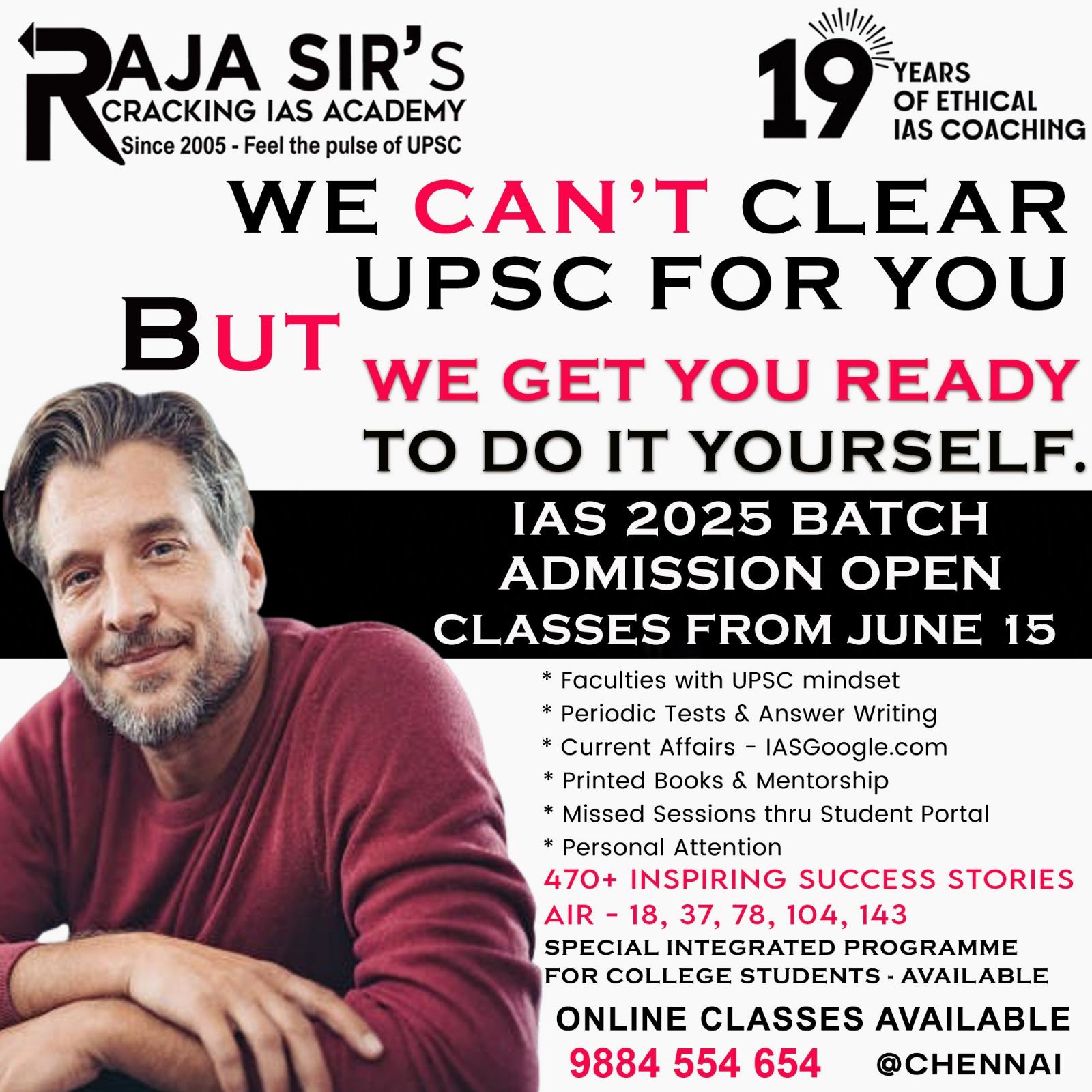
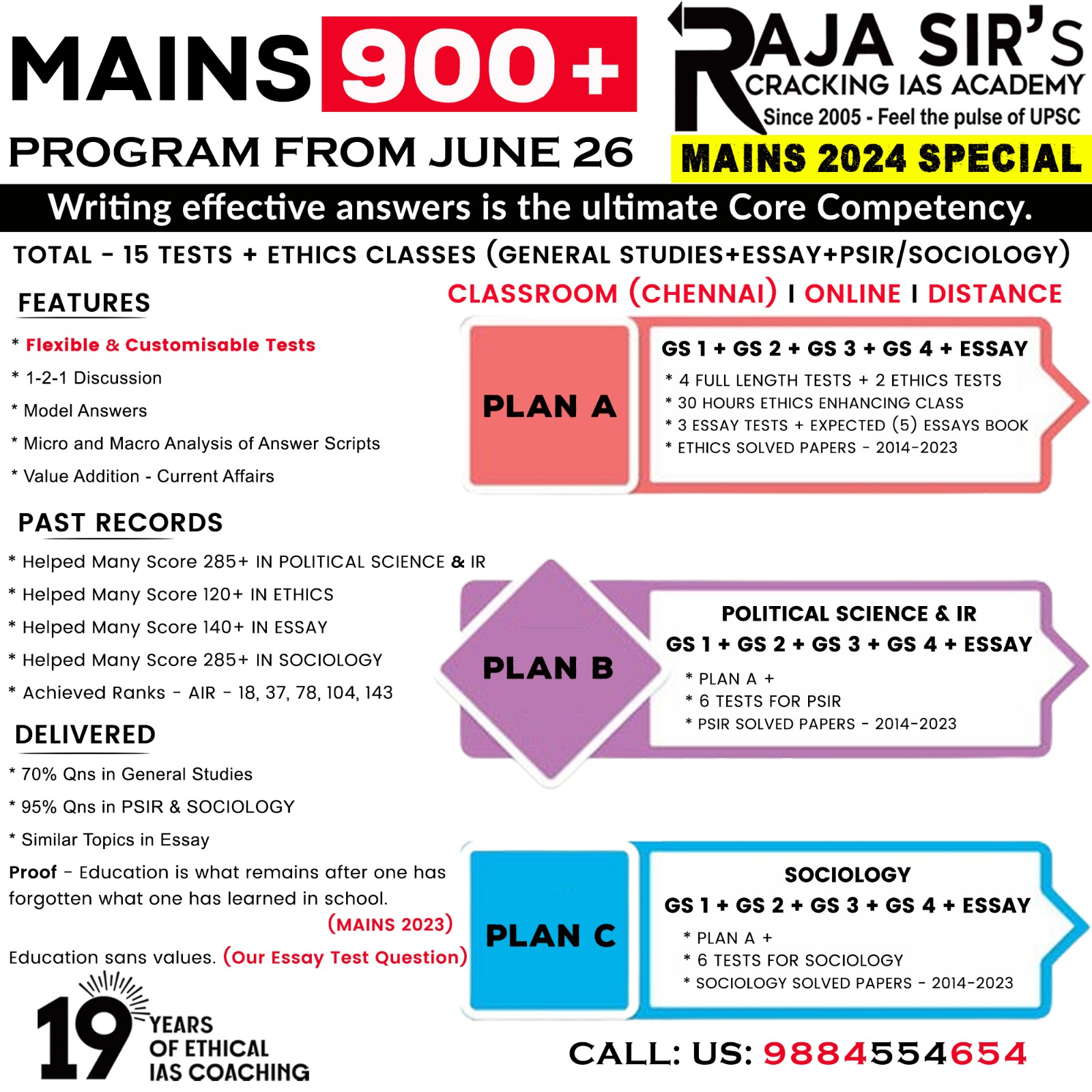
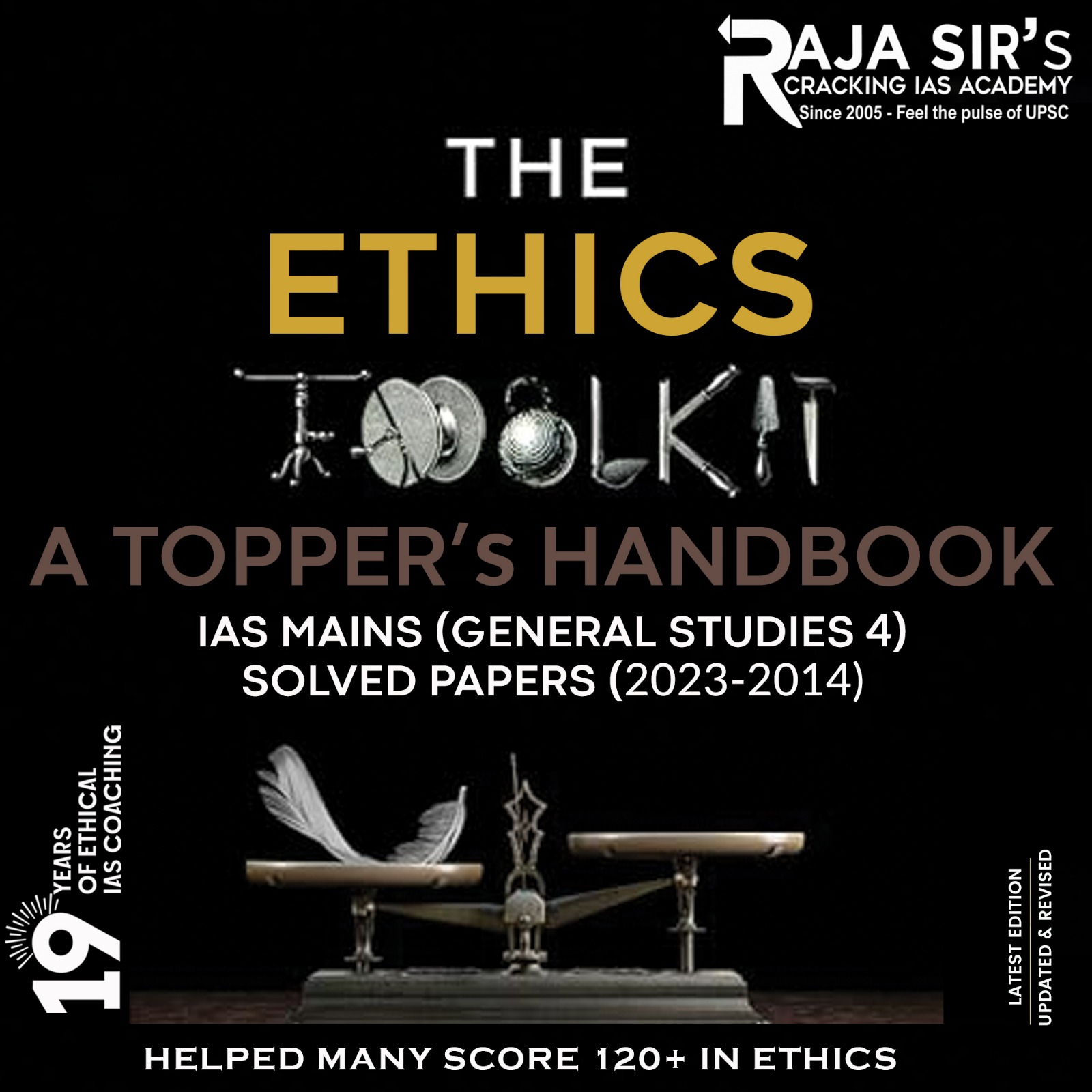
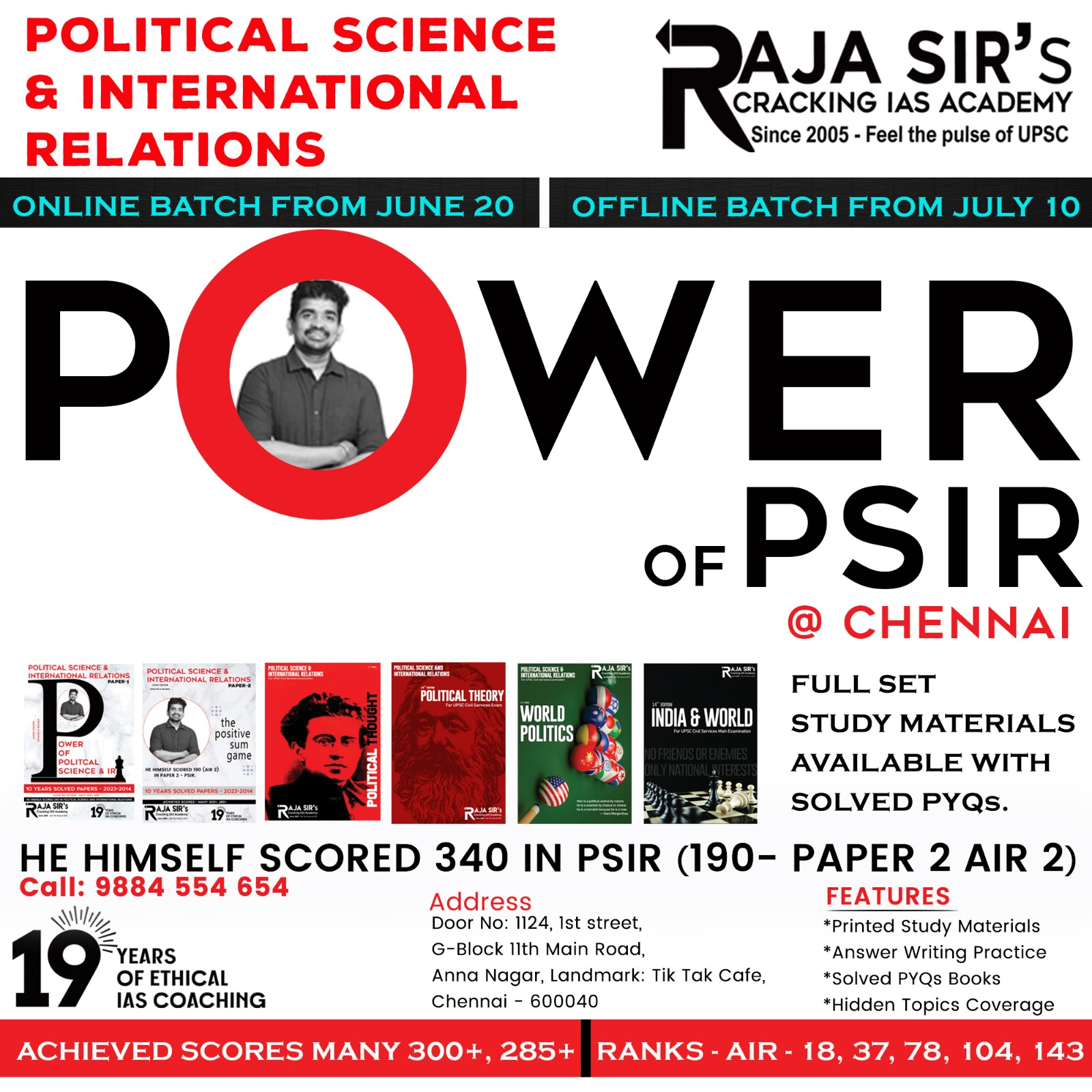
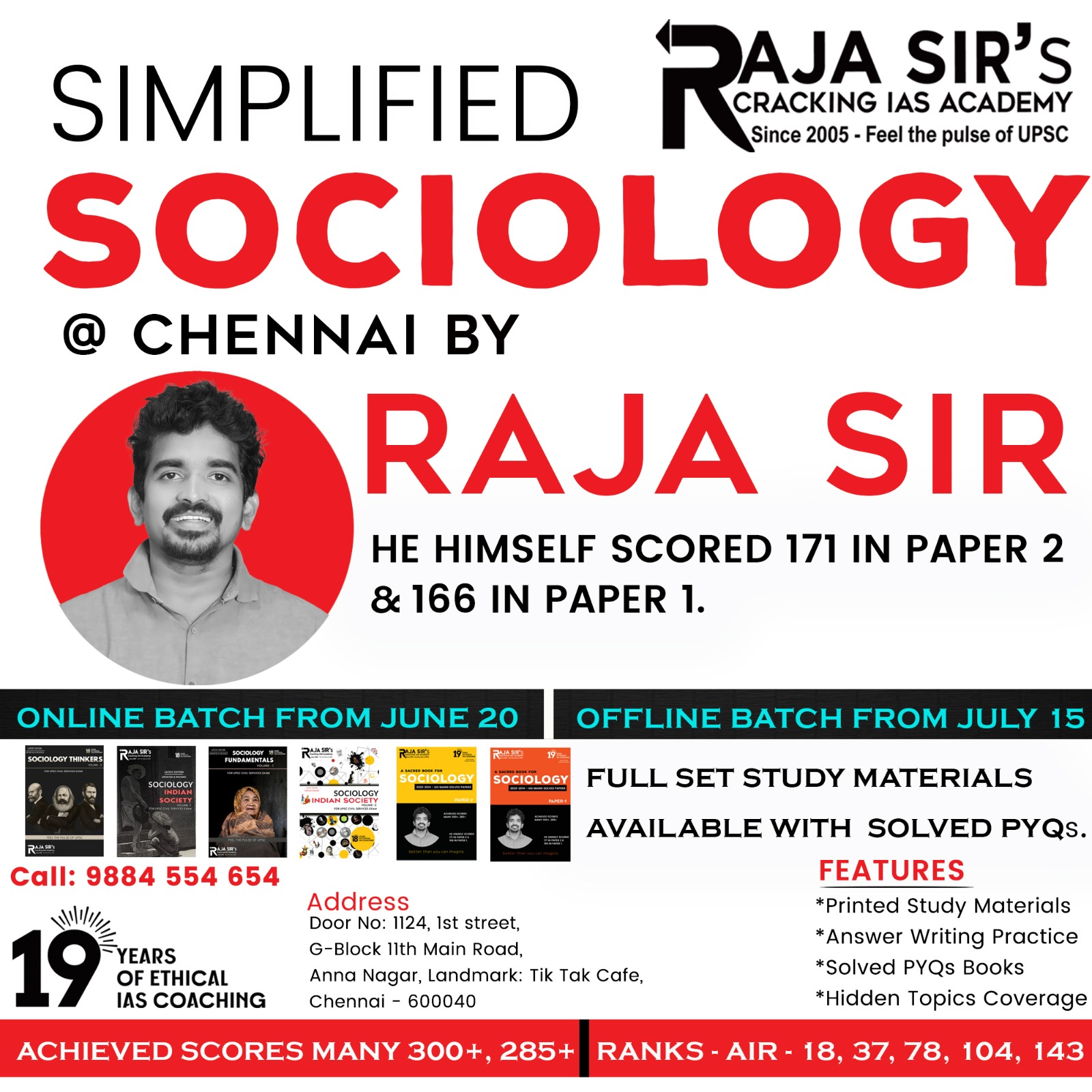
 General Studies
General Studies